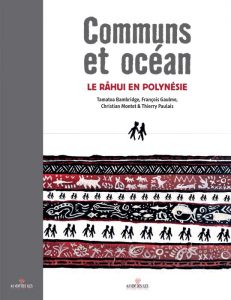Commons and Ocean: The book
This book was co-written with three colleagues- two anthropologists and an economist, and received funding from the AFD. It presents a new approach to the question of commons in Polynesia through case studies based on the lagoons of atolls. The latter raise complex economic and social issues, particularly due to the interaction between multiple players who do not necessarily have the same vested interests, except that of preserving the environmental quality of the lagoon. The Rahui is a system of traditional set-aside from ancient Polynesian society that is currently undergoing a revival and which is similar in some respects to what Elinor Ostrom called commons (Common Pool). One of the purposes of the book is to question the relationship between this tradition of Rahui and the new forms of lagoon management through the notion of commons.
The work is organized into six chapters. The first two, written by François Gaulme, focus on the Rahui in ancient Tahiti and its return to modern day Tahiti. The three articles that follow, signed Tamatoa Bambridge and Christian Montet, concentrate on case studies and lessons to be learned from a common management perspective. The sixth chapter written by myself is devoted to the practical workability of the concept of commons and therefore raises questions of project ownership, legal status and borrowing capacity, and more broadly speaking, taxation and environmental financing mechanisms in French Polynesia.
Commons and Ocean.
The Rahui in Polynesia
Tamatoa Bambridge, François Gaulme, Christian Montet, Thierry Paulais
Published by Au Vent des Iles, Papeete
180 pages
Three posts on ID4D
ID4D (Ideas for Development) is a platform set up in 2008 for discussion and reflection about sustainable development moderated by the Agence Française de Developpement, which attracts 10 000 English and French speaking visitors per month.
I recently published three posts that are downloadable here in French and English, addressing the concept of commonality, meaning either “a world in common” or a Common Pool supported by the Nobel Prize winner Elinor Ostrom.
A “world in common”: the avatars of a concept still subject to question
This forum provides a background history of the notion of a common world from the Stoics to recent times and the philosopher Habermas. It takes a critical look at the use of the concept by environmental and development experts, who appear to be under the impression that the dawn of joint management of the planet will inevitably take place in the foreseeable future. The opinion I express here is that, on the contrary, we are witnessing a weakening of this notion in an increasingly complex world that is filled with growing conflict.
The limits of commons: the case of the Pacific
The purpose of this forum was to examine to what degree the notion of a Common Pool, which initially assumes clear limits and concerns small communities, could be extended on a large scale with overlapping governance activities. To what extent can the concept of physical commonality be expanded?
The forum endeavors to answer this question on the basis of several examples taken from the Pacific, firstly on a local scale, then on an ocean-wide scale. The conclusions are that as much as the Common Pool concept is of relevance on a local scale, it would be ineffective on an ocean-wide scale and could not replace the need for international agreement between the governments of riparian countries and island nations.
Forming hybrid commons: the example of Polynesian lagoons.
This forum speaks out against the partisans of so-called “radical” commons, who have a resolutely anti-state vision and campaign for autonomous commons managed solely by communities. Using the example of Polynesian lagoons, I explain that this radical common ideology risks being counterproductive. Without income, or borrowing power, the purists’ common is only useful for protecting the resource itself, if that. The hybrid common that I am advocating for in the interests of efficiency is founded, in particular, on the financial capacity of local communities and establishes a dialogue between the users of a common that may have a legal status, and the local authorities.


